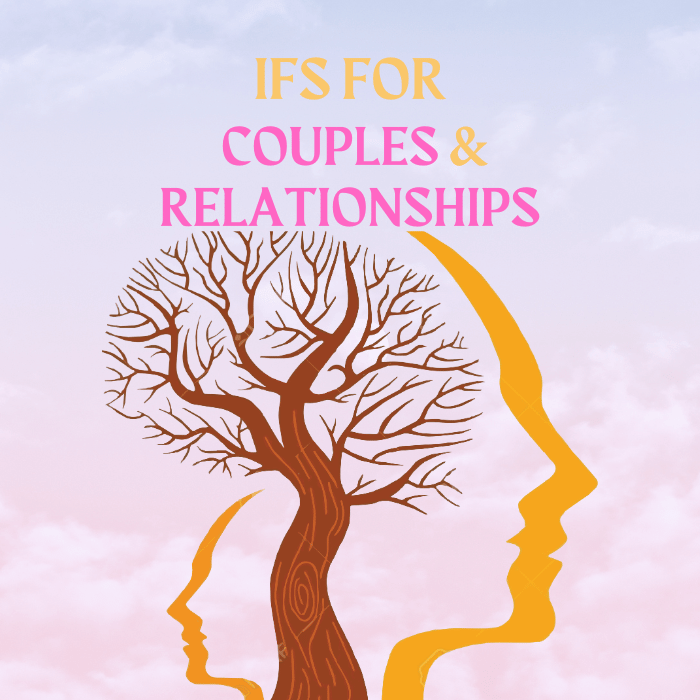IFS for Couples & Relationships
Transforming Your Connection Through Internal Family Systems ❤️

Why Relationships Are Complex (But Worth It) 🌟
Relationships can feel like a rollercoaster 🎢—one moment filled with connection, the next with tension or miscommunication. Whether you’re navigating conflicts, struggling with intimacy, or just want to strengthen your bond, Internal Family Systems (IFS) offers a powerful framework to help. 🛠️✨
Learn more about IFS Basics here
IFS therapy for couples focuses on understanding and healing the “Parts” of yourself and your partner that influence your dynamics. By connecting with these Parts and fostering compassion, couples can break cycles of conflict, improve communication, and deepen their emotional intimacy. 💑❤️
In this article, we’ll explore:
- How IFS applies to relationships.
- Common relational patterns addressed in the IFS for Couples & Relationships Course.
- Practical insights into how this approach fosters connection.
- How you can start your journey with our expertly designed course.
What Is Internal Family Systems (IFS) Therapy? 🧠✨
Developed by Dr. Richard Schwartz, IFS is a therapeutic model that views the mind as being made up of distinct “Parts,” each with its own personality, role, and motivations. 🧩 At the center of this system is the Self, a calm, compassionate leader capable of healing and harmonizing these Parts. 🌿
In relationships, your Parts interact not only with your inner system but also with your partner’s Parts. For example:
- Your Protective Part (like defensiveness) might clash with your partner’s critical Part. 🛡️🗣️
- Your Exiled Part (like shame or fear of rejection) might be triggered by a simple comment. 😢💬
By understanding these dynamics, IFS empowers couples to relate from their Self rather than their reactive Parts, fostering deeper trust and connection. 🌟🤝
What are Parts in IFS?
Why IFS Works for Couples 💑🔍
1. Understanding Emotional Triggers 🎯😮
Every couple experiences moments where a comment or action sparks an emotional reaction. These triggers are often rooted in past experiences and Exiled Parts carrying unresolved wounds. 🥺💔
IFS helps partners recognize:
- What triggers them.
- Which Part is being activated.
- How to respond with compassion instead of reactivity.
2. Building Empathy Through Self-Energy 🤗💖
When both partners connect with their Self, communication becomes more open and empathetic. Instead of blaming or withdrawing, they can:
- Listen with curiosity. 🤔
- Validate each other’s feelings. ❤️
- Collaborate to address underlying issues. 🛠️
3. Transforming Conflicts into Opportunities 🚀🌈
With IFS, conflicts become an opportunity for growth rather than a source of division. By addressing the Parts fueling disagreements, couples can:
- De-escalate tensions. 😌
- Understand each other’s needs. 🤝
- Create lasting resolutions. 📝
What is SELF in IFS?
What the IFS for Couples & Relationships Course Offers 🎓❤️
Our IFS for Couples & Relationships Course is designed to help couples integrate these principles into their daily lives. Whether you’re new to IFS or already familiar with its basics, this course will equip you with tools to navigate your relationship with greater ease and harmony. 🌟✨
Key Features of the Course 📚🛠️
- Understanding Relational Patterns: Learn to identify and work with the Parts that shape your interactions. 🧩
- Developing Self-Leadership: Discover how to lead your relationship from a place of calm, clarity, and compassion. 🧘♀️🌿
- Rebuilding Trust: Heal past wounds that may be impacting your ability to trust and connect with each other. 🤝❤️
- Practical Exercises and Tools: Engage in guided activities to improve communication, address conflicts, and nurture intimacy. 📝🎨
- Integration Support: Apply what you learn with step-by-step guidance for real-world relationship challenges. 🛤️✨
Check out our IFS For Couples & Relationships Offline Course
Common Relationship Patterns Addressed by IFS 🧩💬
1. The Pursuer-Distancer Dynamic 🚀🏃♂️
What it looks like: One partner seeks closeness (Pursuer) while the other retreats (Distancer). 👫💨
How IFS helps: Helps each partner explore the Parts driving their behavior and find healthier ways to connect. 🌟🤝
2. Emotional Avoidance 😶🚫
What it looks like: Avoiding difficult conversations or shutting down emotionally. 🗣️❌
How IFS helps: Encourages Self-led communication to address fears and build trust. 🕊️💬
3. Reactive Defensiveness 😡🛡️
What it looks like: Responding to feedback with anger, denial, or withdrawal. 🙅♂️🔥
How IFS helps: Soothes Protector Parts, allowing for constructive dialogue. 🧘♀️✨
4. Overlapping Trauma Responses 😨💔
What it looks like: Both partners’ unresolved wounds amplify each other’s pain. 😢🔄
How IFS helps: Supports healing Exiles and reducing the intensity of triggers. 🕊️🌈
The Science Behind IFS in Relationships 🔬📊
IFS has been recognized as an evidence-based practice by the National Registry of Evidence-Based Programs and Practices (NREPP). 🏅 Research demonstrates its effectiveness in:
- Improving emotional regulation. 😌🧠
- Reducing relational conflict. 🔄💔
- Enhancing overall well-being. 🌿💖
A study published in the Journal of Marital and Family Therapy found that couples practicing IFS techniques reported:
- Increased relationship satisfaction. 😊💑
- Greater emotional intimacy. 💖🔗
- Reduced conflict frequency and intensity. 🔇🔥
By addressing the root causes of relational patterns rather than just the symptoms, IFS creates lasting change. 🌟✨ It’s like upgrading your relationship software for smoother operations! 🖥️🔧
How to Get Started with IFS for Couples 💡🚀
1. Enroll in the IFS for Couples & Relationships Course 🎓❤️
This comprehensive course provides everything you need to understand your Parts, strengthen your bond, and cultivate a healthier relationship. 📚🌿
2. Use the IFS Guide App 📲🤖
Stay connected to your inner work with the IFS Guide App, a pocket-sized tool to track your Parts, practice dialogue, and build Self-leadership skills. 📱✨
3. Work with an IFS Practitioner 🧑⚕️💬
For personalized support, consider working with a therapist trained in IFS for couples. They can guide you through the process and help tailor strategies to your unique relationship dynamics. 🧑🤝🧑🌟
Practical Tips for Applying IFS in Your Relationship 🛠️💖
Pause During Conflicts ⏸️😌
When tensions rise, pause and ask: “Which Part of me is activated right now?” 🧘♀️ This creates space for your Self to step in and respond thoughtfully instead of reacting impulsively. 🚶♂️✨
Name the Parts 🏷️🔍
Share with your partner: “I think my defensive Part is showing up because I’m feeling vulnerable.” 🗣️ This helps both of you understand the underlying dynamics and fosters empathy. 🤝❤️
Lead with Self-Energy 🌟🧘♂️
Before reacting, connect with your Self by focusing on calmness, curiosity, and compassion. 🌿 This helps you approach interactions with a clear and loving mindset. 💖
Practice Active Listening 👂💬
Show curiosity about your partner’s Parts. Ask: “What’s coming up for you right now?” 🧏♀️ This encourages open dialogue and deeper understanding. 🧠✨
Final Thoughts: Building a Self-Led Relationship 💞🌈
Relationships thrive when both partners feel understood, valued, and supported. 💖 The IFS for Couples & Relationships Course provides a proven framework to achieve this by fostering compassion, healing past wounds, and strengthening communication. 🛠️✨
Start your journey today to build a relationship rooted in connection, trust, and growth. 🌟🚀
FAQ
A: IFS therapy helps by understanding the ‘Parts’ within each partner that influence relationship dynamics. This understanding fosters compassion, improves communication, breaks cycles of conflict, and deepens emotional intimacy.
A: IFS therapy addresses several patterns, including the Pursuer-Distancer dynamic, emotional avoidance, reactive defensiveness, and overlapping trauma responses, helping partners understand and transform these dynamics.
A: The course offers insights into understanding relational patterns, developing self-leadership, rebuilding trust, and practical exercises to enhance communication, resolve conflicts, and nurture intimacy.
A: IFS helps individuals recognize what triggers them, which Part of themselves is activated, and how to respond with compassion instead of reactivity, thereby mitigating conflicts and enhancing understanding.
A: Yes, even individual participation in IFS therapy can lead to significant changes in relationship dynamics by helping one partner manage their own Parts more effectively, which can indirectly improve interactions with their partner.
A: You can enroll in the IFS for Couples & Relationships Course, use the IFS Guide App for ongoing practice, or work directly with an IFS-trained therapist for personalized guidance.
Monthly IFS Workshops & Challenges!
Every month we organize online workshops to help you get a deeper understanding of IFS!
